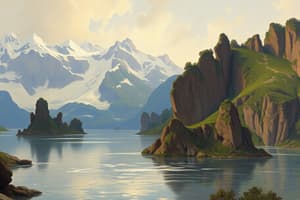Podcast
Questions and Answers
What are three surface features that are caused by constructive forces?
What are three surface features that are caused by constructive forces?
Volcanoes, Rain, Sandbar
Identify three examples of surface features caused by destructive processes.
Identify three examples of surface features caused by destructive processes.
Valleys, Canyons, Volcanoes
What is deposition?
What is deposition?
The process by which eroded materials are dropped off in another place to form landforms.
What does deposition create at the mouth of a river?
What does deposition create at the mouth of a river?
What does deposition create at the beach?
What does deposition create at the beach?
Are volcanoes constructive?
Are volcanoes constructive?
What is weathering?
What is weathering?
What causes physical weathering?
What causes physical weathering?
What causes chemical weathering?
What causes chemical weathering?
What is erosion?
What is erosion?
What are five ways that erosion can occur?
What are five ways that erosion can occur?
Are earthquakes constructive or destructive and why?
Are earthquakes constructive or destructive and why?
What causes a tsunami?
What causes a tsunami?
What can plants help prevent?
What can plants help prevent?
What have humans done to prevent floods?
What have humans done to prevent floods?
How is a glacier constructive and destructive?
How is a glacier constructive and destructive?
What is beach reclamation?
What is beach reclamation?
Where do earthquakes occur?
Where do earthquakes occur?
How do scientists predict when a natural disaster will occur?
How do scientists predict when a natural disaster will occur?
What typically causes a volcano to erupt?
What typically causes a volcano to erupt?
How are barrier islands created and why are they important to the Georgia coastline?
How are barrier islands created and why are they important to the Georgia coastline?
Flashcards are hidden until you start studying
Study Notes
Constructive Forces
- Volcanoes create new land and fertilize soil, leading to the formation of islands.
- Rain supports plant growth and provides essential water for animals.
- Sandbars are formed through the process of water deposition.
- Sand dunes are shaped by the action of wind.
- Barrier islands also arise from water deposition, playing a critical role in coastal ecosystems.
Destructive Processes
- Valleys are formed by the erosive action of glaciers.
- Canyons develop due to river erosion over time.
- Volcanoes can act destructively by devastating communities and property during eruptions.
Deposition
- Deposition is the process where eroded materials settle in new locations to create landforms like deltas at river mouths.
- At beaches, deposition results in the formation of sandbars and barrier islands.
Weathering
- Weathering involves the breakdown of rocks and materials into smaller pieces through natural processes.
Types of Weathering
- Physical weathering occurs due to environmental factors such as wind, water, waves, and ice.
- Chemical weathering is driven by chemical reactions, such as acid rain affecting rock structures.
Erosion
- Erosion refers to the movement of weathered rock materials from one location to another.
- Key agents of erosion include gravity, water, waves, and wind.
Earthquakes
- Earthquakes can be both constructive and destructive; they create new landforms like coastal plains and can lead to land destruction.
- Tsunamis are generated by underwater earthquakes.
Role of Plants
- Vegetation helps mitigate natural disasters by preventing mudslides, landslides, and soil erosion.
Flood Prevention Techniques
- Humans employ various measures like levees, sewers, dams, and groins to control flooding.
Glaciers
- Glaciers are both constructive, as they deposit sediment to form new land, and destructive, as they erode landscapes through plucking and abrasion.
Beach Reclamation
- Beach reclamation involves adding sand to eroded beaches to restore them.
Earthquake Prediction
- Scientists predict natural disasters using tools like warning systems, tiltmeter measurements, analysis of fault lines, tectonic activity, and seismographs.
Volcanic Eruptions
- The buildup of gas pressure in magma typically triggers volcanic eruptions, often preceding earthquakes.
Barrier Islands
- Barrier islands form through sand movement from beaches due to wave action and play a protective role for shorelines by buffering against wave erosion.
Studying That Suits You
Use AI to generate personalized quizzes and flashcards to suit your learning preferences.



